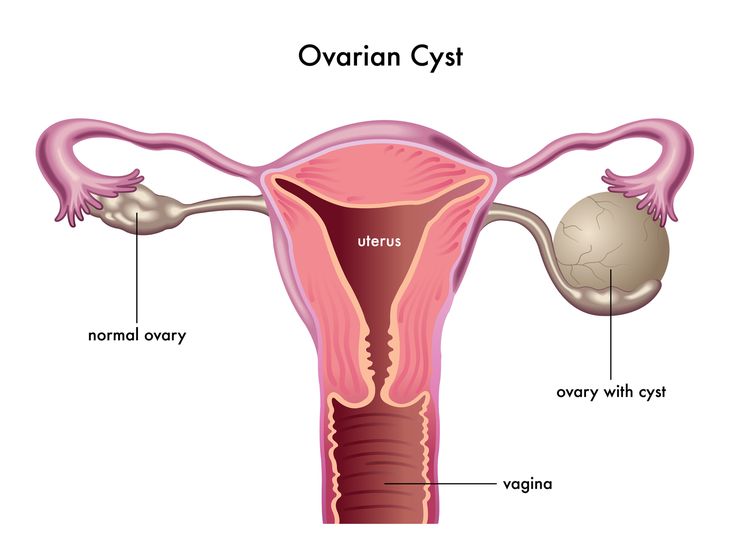Ovarian Cysts - Symptoms, Causes and Treatments

Various indications point to the possibility that there is a case that the cyst in the ovary may burst. Understanding the symptoms of the cysts bursting or ovarian cysts rupture is necessary because otherwise, proper diagnosis is difficult. Thus it is essential to identify the symptoms because it is often the starting point of the diagnosis.
Yes, the practitioner is best placed to identify the symptoms, but self-diagnosis may also help a person discover the initial warning signs that the ovarian cyst may rupture. Keeping an eye out for possible ovarian cyst rupture symptoms can go a long way in getting cured quickly and avoiding complications. It is good to get in the habit of self-diagnosis to ensure early detection and expedited recovery.
The Signs and Symptoms
Pain and discomfort are some of the chief symptoms of cysts in the ovary bursting, and they are ignored often as these symptoms are usually linked with normal menstruation. Unfortunately, many women brush aside these symptoms as natural symptoms of menstruation and other related minor problems. However, besides these, there are other less apparent symptoms that the ovarian cyst may rupture. Moreover, if you have already been diagnosed with ovarian cysts, any symptoms should be examined without delay besides those generally associated with the cysts. Diligent monitoring is crucial as it helps to find out the cyst symptoms and link them up to the cases. Here are some of the ovarian cyst rupture symptoms that are commonly seen:
Extremely Irregular Menstrual Cycle
In women of childbearing age, a case of sudden ovarian cyst rupture may lead to periods that become highly irregular. The periods themselves can vary from being very light to extremely heavy. This calls for immediate medical attention. Erratic periods may also give rise to a host of other problems such as mood swings, emotional disturbances, weight gain, acne, and others. Therefore, such symptoms should be given their due importance as they might indicate that there is a complication that is perhaps deep-rooted.
Bleeding
non-menstrual bleeding should always be taken seriously. Such bleeding can take place if there is a case of ovarian cyst rupture. This is even more probable for somebody who has already been diagnosed with ovarian cysts. Hence, any abnormal bleeding should be investigated without delay, especially at times other than during menstruation.
Bladder Pressure
The ovarian cyst that gets ruptured may create unusual stress on the urinary bladder and cause the affected individual to urinate more frequently. To add insult to the injury, some women may also find that it is not easy to get it out, even when the call of nature to pass urine is strong. Watch out for discomfort and pain during urination as they might indicate a ruptured ovarian cyst.
Pelvic Pain
Ovarian cyst causes some degree of pain in the pelvis region. When a cyst ruptures, this pain gets more intense. Sudden pain needs to be examined because this pain may indicate that there is some other complication.
Physical Modifications
Keep an eye open for abnormal physical changes like tenderness in the breast, change in body structure, and sudden unexplained weight gain. These may indicate a rupture in the ovarian cyst.
Nausea and Vomiting
In some women, symptoms usually experienced during pregnancy, such as abdominal heaviness, nausea, and vomiting, may result from ovarian cyst bursting. A feeling of nausea may lead to vomiting, and these symptoms may continue despite using conventional medication. Fainting spells, lightheadedness, and dizziness are other possible symptoms of an ovarian cyst rupture.
Besides these usual symptoms of a rupture in the ovarian cyst, if there are any irregularities in the gynecological health, plus the person’s health, they need to be checked out diligently without negligence. This is all the more true if you already know that you have ovarian cysts. Only regular monitoring would help in early detection and starting the proper treatment promptly.
Trying to Fight The Condition
Being diagnosed with ovarian cysts is only half the story. One should now start a process of treatment. Sometimes, some medications, including those that conventional practitioners prescribe, are ineffective in treating ovarian cysts. The reason behind this is that such medicines seek to address just the symptoms of the condition or, at best, treat once there has already been a rupture. They fail to address the problem from its grassroots level and, thus, never reach the primary cause of the issue. This leaves the patient open to the threat of a recurrence of the cyst after its cure. The best option is to use the holistic approach to address the problem at its core and thus, receive the benefits of a truly comprehensive treatment.
Holistic Treatment
The holistic approach determines the proper line of action only after the symptoms of the cyst bursting are clearly understood and analyzed. The steps to be taken under this treatment vary from case to case, depending on how severe or intense the problem and the complication are. However, since holistic treatments are multidimensional, it can positively benefit most patients because it seeks to heal the problem in a more efficient, more effective, and more natural manner. In some rare cases where the condition is severe, surgery may be needed. But in most other cases, a holistic approach is all you will need to cure yourself entirely and break free from the clutches of ovarian cysts.
Trending Health Topics
- ADHD
- Allergies
- Arthritis
- Bipolar Disorder
- Bunions
- Car Accidents
- Chron's Disease
- Common Cold
- COPD
- Depression
- Dry Skin
- Dry throat
- Eczema
- Fungal Infection
- GERD
- HIV/AIDS
- Hypertension
- Irritable Bowel Syndrome (IBS)
- Multiple Sclerosis
- Osteoarthritis
- Psoriasis
- Rheumatoid Arthritis
- Skin Disorders
- strep throat
- Type 2 Diabetes
- Uncategorized